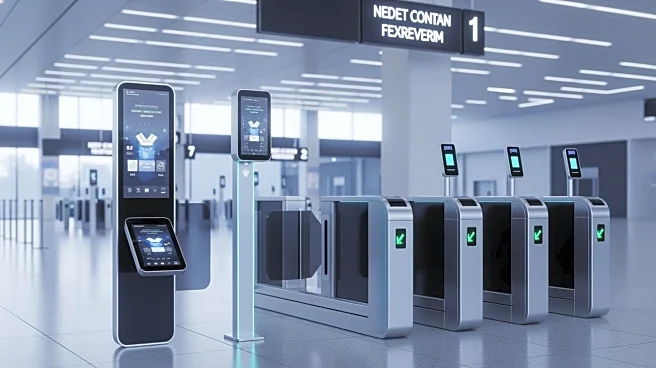What's Happening?
The Smart Self Boarding Gates market is poised for substantial growth, with projections indicating an increase from $1.35 billion in 2024 to $3.5 billion by 2032, reflecting a compound annual growth rate
(CAGR) of 12.1%. These automated gate systems, equipped with biometric and digital technologies such as facial recognition and barcode scanning, are designed to streamline passenger verification and boarding processes at airports. The market expansion is driven by the need for enhanced operational efficiency, reduced wait times, and improved security, offering a seamless, contactless travel experience. Key players in the market include Wanzl, Dormakaba, and Cambaum, among others, with Europe leading in market presence and Asia-Pacific experiencing the fastest growth.
Why It's Important?
The growth of the Smart Self Boarding Gates market is significant for the aviation industry, as it addresses critical needs for efficiency and security in passenger processing. By adopting these technologies, airports can enhance the passenger experience through reduced wait times and streamlined operations, which are increasingly important in a post-pandemic world where contactless solutions are prioritized. The market's expansion also reflects broader trends in automation and digital transformation within the aviation sector, potentially leading to increased investments in airport infrastructure and modernization projects globally. This growth could benefit technology providers and airport operators, while passengers enjoy improved travel experiences.
What's Next?
As the market for Smart Self Boarding Gates continues to grow, further integration of advanced biometric technologies and digital solutions is expected. Airports worldwide may increase investments in these systems to enhance their infrastructure and meet rising passenger expectations for seamless travel. Additionally, regulatory bodies might develop new standards and guidelines to ensure the security and privacy of biometric data used in these systems. Stakeholders, including technology developers and airport authorities, will likely collaborate to address challenges related to data protection and system interoperability.
Beyond the Headlines
The adoption of Smart Self Boarding Gates raises important considerations regarding data privacy and security. As these systems rely on biometric data, ensuring the protection of personal information will be crucial. Legal frameworks and industry standards will need to evolve to address these concerns, balancing the benefits of technological advancements with the rights of individuals. Furthermore, the shift towards automated systems may impact employment in the aviation sector, necessitating workforce retraining and adaptation to new roles in technology management and system maintenance.









